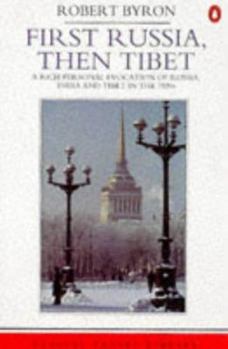First Russia, Then Tibet
Select Format
Select Condition 
Book Overview
Over the course of several months during 1931 and 1932, Robert Byron journeyed to three countries teetering on the brink of change. In Russia, which was stricken by famine, Lenin had just died,... This description may be from another edition of this product.
Format:Paperback
Language:English
ISBN:0140095195
ISBN13:9780140095197
Release Date:January 1985
Publisher:Penguin Group USA
Length:256 Pages
Weight:0.35 lbs.
Dimensions:7.8" x 0.6" x 5.0"
Customer Reviews
1 rating
Excellent travel memoir in the style of Newby and Hopkirk
Published by Thriftbooks.com User , 23 years ago
I first dismissed Robert Byron's book ''First Russia, then Tibet" because it came across as an anti-Soviet diatribe. I picked it up again because a good friend, whose opinion I respect, said that it was good. On a second reading Byron was less prejudiced than I had at first thought, and I realized that what I had thought was right-wing blinkers was in fact a fine aesthetic sensitivity. He also understands that one of the most important things for a travel writer is to observe people and not just places. He describes Russia shortly after Lenin's death.I thought at first that he was there as a political observer but I was a lot more sympathetic when it became clear that he was really interested in the art and architecture. You end up with an interesting picture of Russia just after Lenin's death, and just before Stalin's crackdown.The second two thirds of the book are more interesting, though. He recounts the first commercial flight from Britain to India, which takes all of a week. He then retells a short journey into Tibet, something as forbidden then as it is now. What really stands out is how he describes how everyone looks and lives, be they a Maharajah or Tibetan peasant. You can literally feel and smell the rigors of travel in a place that has not progressed much beyond medieval technology. He does not judge anyone although he is ultimately very sympathetic to the Tibetans' rejection of the modern world. You get the sense that he could have been very scathing about the attitude of the British colonials to the locals, but instead chooses to say nice things about those colonizers who did make the effort to meet the natives on their own terms. One note: the description of a dinner at the governor's house in Darjeeling is one of the funniest passages that I have ever read. Byron's deadpan style is perfect to describe a minor incident in a place where nothing ever happens. It reminds me of the game of cricket in "England, their England". His descriptions of his travel companions, and the fact that they are often more reluctant than he, are gently witty, and turned back on himself. I would recommend this to people who liked "A short walk in the Hindu Kush", or who read Peter Hopkirk's books on exploration and espionage in Central Asia in the last century.





